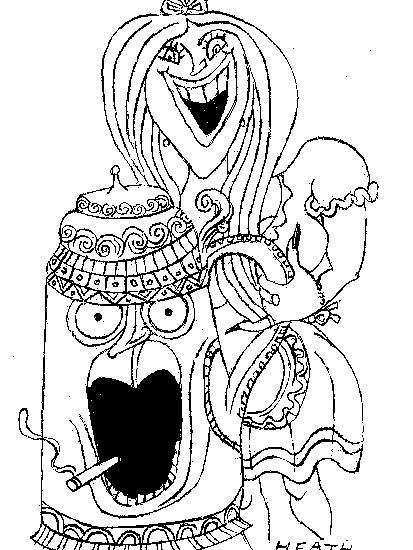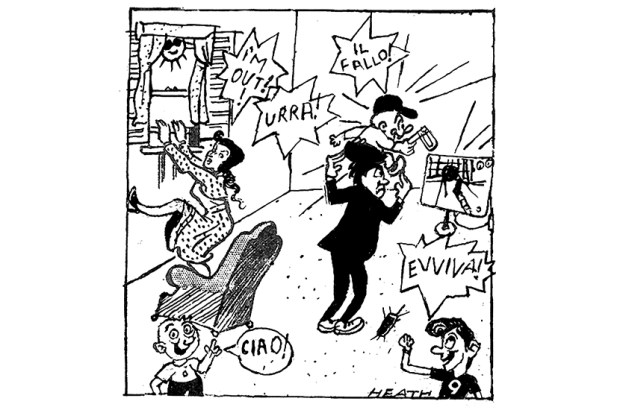Sachsenschweine — Saxon pigs — said the graffiti as my train moved out of Berlin on its way to Dresden. Germany is not as monolithic as it can seem: not only do some of its ancient kingdoms continue a ghostly existence as states of the Federal Republic, but also their populations nurture historic rivalries, at least on the football pitches. But the new popular movement in Dresden — Pegida, or ‘Patriotic Europeans against the Islamisation of the West’, no less — has thrown into relief keener intra-German divisions: not only those between immigrants and ethnic Germans but also those between many German voters and the country’s mortally politically correct establishment.
The French-Russian philosopher Alexandre Kojève was right to predict that, in a post-modern globalised world devoid of traditional values, the only remaining factor structuring society would be snobbery. When Kathrin Oertel, the de facto leader of Pegida, appeared on a chat show on 18 January, she was asked by the anchorman, ‘Who are Pegida’s supporters?’ ‘Ordinary people like you and me,’ she replied. Quick as a flash, the presenter retorted, ‘Like you, maybe. Like me, maybe not.’ Seldom has a member of the media super-class spoken so lucidly.
It is not difficult to mock her thus. Frau Oertel is Essex woman. Although she and her colleagues can mobilise 15,000 to 20,000 people in a wintry square every week, she is tongue-tied and gauche when dropped into national TV. Some of what she says makes sense but, for a protest movement, it has a bizarre lack of focus: the gripes range from immigration to the ‘media of lies’ and the need for more referendums. The language and views of the Stammtisch (the pub regulars) may be a growing political force in Germany, but they have yet to find someone to articulate them in the public sphere: in Britain, Nigel Farage’s smiling combination of dapper suits with a pint and a fag does the trick perfectly.
Worse, Pegida’s 19-point programme does not even contain any reference to Islamisation or Islamism. It talks instead about ‘radicalism, whether political or religious’ and about how parallel societies governed by sharia are undesirable. Faced with the biggest existential issue for the West today, the reaction of Germany’s biggest so-called anti-Islamist movement is silence. Pegida has dropped the ball, if it ever held it in the first place. It is not even clear how the protests will continue — the movement’s momentum in the last few months has been so meteoric (from 300 protesters at the first march to 25,000 two weeks ago) that it can only fizzle out as it comes down to earth.
Snobbery was also the prime mover behind the great anti-Pegida concert organised by the Dresden city authorities on Monday night. One after another, ageing luvvies came on stage to express their contempt for the movement. ‘Pegida is an uprising of stupid ignoramuses,’ a 60-year-old rocker told the crowd to applause. The propaganda was grotesque: one Muslim woman claimed that immigrants now do not feel safe on the streets of the city — what tosh! — while a Spanish student at the university said that Pegida should learn to accept people from different backgrounds. (It is obvious that no one in Pegida has ever even thought of attacking such temporary intra-European movement of people.) The slogans ‘Humanism’, ‘Equality’ and ‘Tolerance’ were shone on to the surrounding buildings, just as 25 years ago the Communist authorities would have proclaimed ‘Unity’, ‘Equality’ or ‘Peace’. Pegida’s organisers themselves took part in the ‘Wir sind das Volk’ marches in 1989; one had the impression on Monday that they had marched in vain.
And, just as at the ‘Je suis Charlie’ march in Paris a fortnight ago, the exalted ‘diversity’ was in fact absent from the attendees of the ‘Wir sind nicht Pegida’ concert. The usual ethnic mix of most German cities vanished as Europeans alone congregated to parade their self-laudatory (and self-destructive?) values of tolerance. Moreover, just as the French marches celebrated the right to free speech at the same time as the police were arresting the anti-Zionist comedian Dieudonné in a dawn raid for another one of his tasteless tweets, so the German political-media-artistic establishment engaged in a truly hallucinatory act of double-think when it continued to denounce Pegida for exaggerating the Islamist danger, while approving the cancellation of the previous week’s march because of a credible threat that the movement’s leader would be assassinated.
But the master — or mistress — of doublethink is Mutti herself: Mummy, as the German Federal Chancellor is sarcastically known. (She has deliberately never had any children.) Angela Merkel put on her glummest rainy-afternoon-in-Chemnitz face to give Pegida supporters a sound telling-off during her New Year’s broadcast to the nation earlier this month. ‘I say to those who go to these marches, don’t follow these people! They have prejudices, coldness, even hatred in their hearts!’ This is the same woman who, in 2010, wowed a room full of CDU young bloods with a full-frontal attack on uncontrolled immigration and multiculturalism. When the same person goes from being Norman Tebbit to Shami Chakrabarti in four years, there must be something wrong. No wonder Germans are angry with her.
Got something to add? Join the discussion and comment below.
Get 10 issues for just $10
Subscribe to The Spectator Australia today for the next 10 magazine issues, plus full online access, for just $10.
You might disagree with half of it, but you’ll enjoy reading all of it. Try your first month for free, then just $2 a week for the remainder of your first year.














Comments
Don't miss out
Join the conversation with other Spectator Australia readers. Subscribe to leave a comment.
SUBSCRIBEAlready a subscriber? Log in